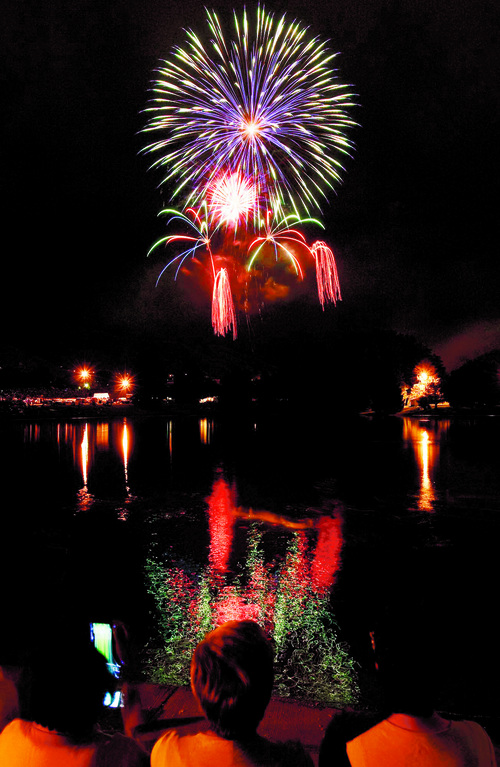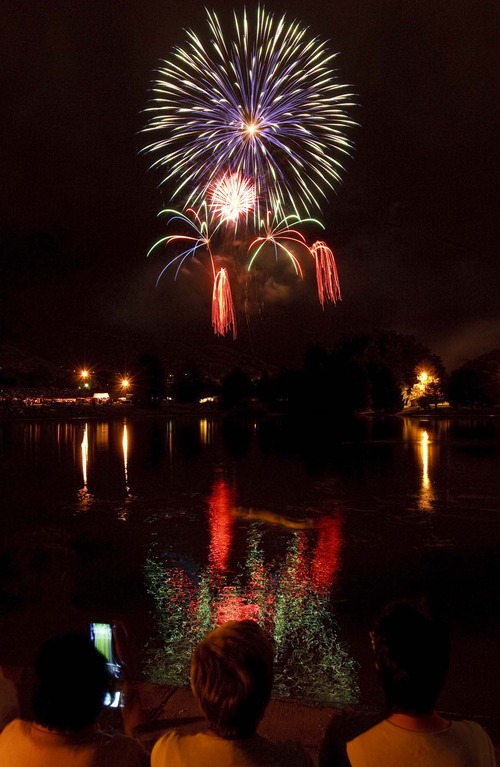This is an archived article that was published on sltrib.com in 2014, and information in the article may be outdated. It is provided only for personal research purposes and may not be reprinted.
To make a statement for cleaner air, Salt Lake City Mayor Ralph Becker is proposing to eliminate city-sponsored fireworks this summer at Liberty and Jordan parks.
But will the City Council go along?
Council members have made only fleeting references to the fireworks issue since Becker unveiled his $229 million spending plan for next fiscal year.
But those remarks made it clear that the mayor's decision to eliminate a $25,000 line item for the shows — July 4 at Jordan Park and July 24 at Liberty — will face debate once the council gets down to the nitty-gritty of approving a budget.
"Will [elimination of fireworks] have a measurable effect on air quality considering all of the other private fireworks that people blow up and the commercial [displays] at sporting events?" Councilman Luke Garrott wondered aloud before the discussion was deferred until later.
Maybe not immediately, from a purely scientific measurement of pollution levels, acknowledged Becker's spokesman, Art Raymond. But Becker's approach packs symbolic importance, he added, encouraging others to join with the city in combatting what many people perceive to be the Salt Lake Valley's worst problem: bad air.
"We're trying to do things as a city that set the tone and establish some best practices that we hope others in the valley will make note of and observe as they see fit," Raymond said.
"We recognize this is a small change. But a series of small things cumulatively make a big difference," he added, citing Salt Lake City's enforcement of laws against excessive idling, its conversion of city vehicles to clean-burning fuels and its plans to replace pollution-belching equipment.
Scrapping fireworks is "another small step in the direction we want to go," said Raymond, optimistic that technology will provide "alternative, nonpolluting ways to have these celebrations. Every year there's more options with laser shows and projections that we hope can be the new way we celebrate holidays in ways that are friendly to air-quality issues."
Council Chairman Charlie Luke said he understands the rationale behind the mayor's proposal, but has reservations about whether it would improve air quality enough to offset the loss of popular, community-building events.
"I raised the issue around New Year's when they were planning the fireworks show for Eve and we were in an inversion," Luke said. "But in the middle of summer it's different, especially when you have private venues like Bees games that shoot [fireworks] off routinely."
The Bees usually have fireworks after their July 24 home baseball game, at the same time as the Liberty Park show a few blocks away. Jordan Park fireworks share the valley's night sky July 4 with pyrotechnics in Murray, Holladay and, most of all, Sugar House Park.
City resident George Chapman, one of the few people to attend a May 20 public hearing on the proposed budget, said the city would fight pollution more effectively if it focused less on fireworks and more on the traffic gridlock before and after shows.
"You have to get UTA [Utah Transit Authority] to provide more service to Sugar House Park," he said. "All those cars idling [in traffic jams] is where the air pollution comes from."
A final council decision is expected in mid-June.
Twitter: @sltribmikeg —
Budget hearing
The Salt Lake City Council will hold a second public hearing June 3 on Mayor Ralph Becker's $229 million budget proposal for 2014-15, including the elimination of two fireworks shows. The hearing will be at 7 p.m. in Room 315 of City Hall, 451 S. State.





